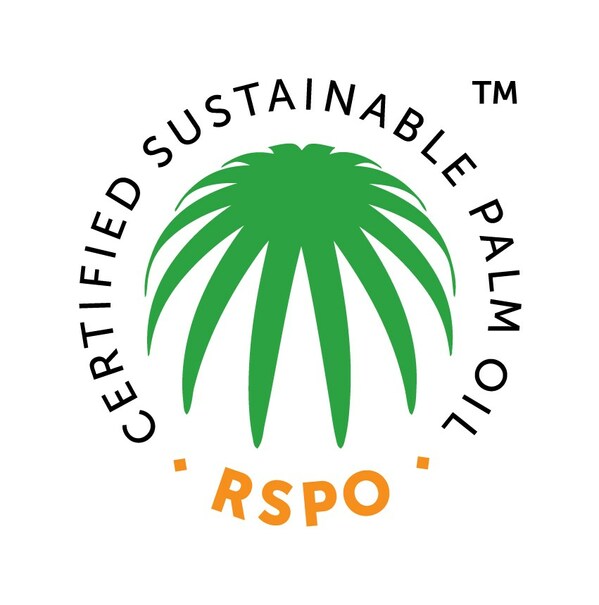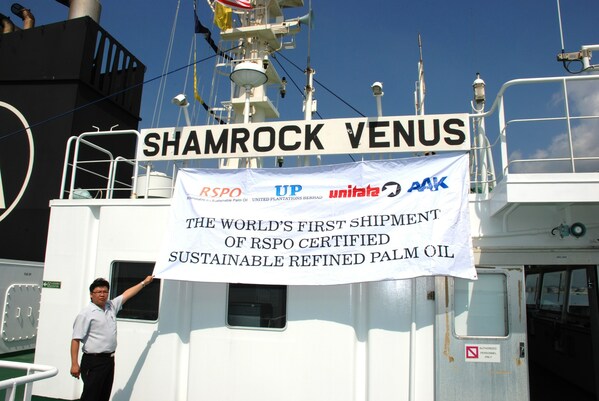 |
KUALA LUMPUR, Malaysia, April 8, 2024 /PRNewswire/ -- Nearly two decades ago, the European market marked a milestone in the global trade of palm oil when a shipment of barrels bearing the Roundtable on Sustainable Palm Oil (RSPO) trademark arrived in Rotterdam, the Netherlands on 11 November 2008. The shipment, originating from Malaysia, contained the world's first cargo of certified sustainable palm oil (CSPO).

Encouraged by a strong sentiment across the European market in the early 2000s advocating for more sustainably sourced palm products, several actors came together to strategically set the parameters for the sustainable production of palm oil.
As the first palm oil grower to have all of its operations certified in 2008, United Plantations (UP) in Malaysia produced the first shipment of RSPO CSPO, which was imported by AarhusKarlhamn (AAK), United Kingdom. Among the first buyers of CSPO were Sainsbury's Supermarkets Ltd. and Unilever NV.
Since then, RSPO has seen membership increase from 500 members in 2010 to nearly 6,000 in 2024, with Europe accounting for 2,854. In 2022, a total of 2,788,061 MT of RSPO CSPO entered the European market. Europe remains the largest buyer (45%) of CSPO and has been a catalyst in leading the global market transformation.
The Dutch market continues to be one of the RSPO's strongest advocates. A group of private organisations formed the Dutch Alliance for Sustainable Palm Oil (DASPO) in 2008 with the goal that all palm oil imported into the Dutch market be RSPO certified by 2015. Not only has this goal been met, but this national initiative has inspired similar initiatives in various European countries.
As the RSPO marks its 20th year anniversary in April 2024, the global partnership reaffirms its commitment to the founding mission of sustainably transforming the palm oil sector, through the collective efforts of the RSPO's nearly 6,000-strong voluntary member base from all sectors of the palm oil value chain across 103 countries and territories. To date, CSPO production exceeds 15 million MT, representing 20% of global crude palm oil production.
Today, RSPO Standards are among the top tier in agricultural sustainability standards and the RSPO is a member of the ISEAL Alliance. The RSPO is enforced by robust assurance, grievance and remediation systems, designed to protect natural resources, safeguard wildlife habitats, and promote the livelihoods and development of smallholders and rural communities around the world.
About RSPO:
The Roundtable on Sustainable Palm Oil (RSPO) was formed in 2004 with the objective of promoting the growth and use of sustainable oil palm products through credible global standards and engagement of stakeholders. RSPO is a not-for-profit, international, membership organisation that unites stakeholders from the different sectors of the palm oil industry including oil palm producers, palm oil processors or traders, consumer goods manufacturers, retailers, banks and investors, environmental or nature conservation NGOs, and social or developmental NGOs.
This multi-stakeholder representation is mirrored in the governance structure of RSPO such that seats in the Board of Governors, Steering Committees and Working Groups are fairly allocated to each sector. In this way, RSPO lives out the philosophy of the "roundtable" by giving equal rights to each stakeholder group, facilitating traditionally adversarial stakeholders in working together to reach decisions by consensus, and achieving RSPO's shared vision of making sustainable palm oil the norm.
The seat of the association is in Zurich, Switzerland, while the secretariat is currently based in Kuala Lumpur with satellite offices in Jakarta (ID), London (UK), Zoetermeer (NL), Beijing (CN) and Bogotá (CO).
Photo - https://mma.prnasia.com/media2/2380933/World_s_first_shipment_of_RSPO_certified_sustainable_palm_oil.jpg?p=medium600
Logo - https://mma.prnasia.com/media2/2380937/RSPO_Trademark_Logo_transparent_png_Logo.jpg?p=medium600